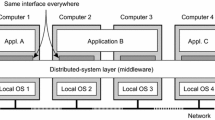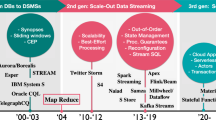Abstract
A well-established approachto the verification of end-to-end response times for distributed,hard real-time systems is an integrated scheduling analysis ofboth task processing and message communication. Hitherto, publishedanalyses have been confined to the computation of worst-casebounds only and best-case response times have been ignored, assumedto be zero or treated approximately. However, there are compellingreasons for computing both upper and lower bounds on responsetimes, not only to allow the verification of best-case performancebut also to improve the accuracy of the overall analysis. Thispaper describes a precise best-case execution time analysis whichreduces jitter and extends distributed scheduling analysis toyield more accurate upper and lower bounds on system responsetimes. The analysis is combined with existing results for worst-caseresponses in a single scheduling algorithm to compute both upperand lower bounds on end-to-end response in distributed systems.
A design tool has been developed to automatethe analysis and support the performance verification of diversereal-time systems composed of tasks executing on multiple processorswhich communicate using the Controller Area Network (CAN) fieldbus.
Similar content being viewed by others
References
Audsley, N. C., and Burns, A. 1998. On fixed priority scheduling, offsets and co-prime task periods. Information Processing Letters 67(2): 65-69.
Audsley, N. C., Burns, A., Richardson, M., Tindell, K., and Wellings, A. J. 1993. Applying new scheduling theory to static priority pre-emptive scheduling. Software Engineering Journal 8(5): 284-292.
Baba, M. D., and Powner, E. T. 1995. Scheduling performance in distributed real-time control systems. 2nd Int. CAN In Automation Conference, pp. 7-2-7-11.
Bate, I., and Burns, A. 1997. Schedulability analysis of fixed priority real-time systems with offsets. Proceedings of Ninth Euromicro Workshop on Real-Time Systems. Toledo, Spain, pp. 153-160.
Bate, I., and Burns, A. 1998. Investigation of the pessimism in distributed systems timing analysis. Proceedings of Tenth Euromicro Workshop on Real-Time Systems. Berlin, pp. 107-114.
Burns, A. 1991. Scheduling hard real-time systems: A review. Software Engineering Journal 6(3): 116-128.
Burns, A., and Wellings, A. J. 1995. Engineering a hard real-time system: From theory to practice. Software—Practice and Experience 25(7): 705-726.
Colnarič, M., Verber, D., Gumzej, R., and Halang, W. A. 1998. Implementation of hard real-time embedded control systems. Real-Time Systems 14: 293-310.
Fidge, C. J. 1998. Real-time schedulability tests for preemptive multitasking. Real-Time Systems 14: 61-93.
Gutiérrez, J. P., García, J. G., and Harbour, M. G. 1998. Best-case analysis for improving the worst-case schedulability test for distributed hard real-time systems. Proceedings of Tenth Euromicro Workshop on Real-Time Systems. Berlin, pp. 35-44.
Henderson, W. D. 1998. The Xrma Toolkit. Technical Report NPC-TRS-98-1, University of Northumbria, School of Computing and Mathematics.
ISO. 1993. 11898—Road Vehicles—Interchange of Digital Information—Controller Area Network (CAN) for high-speed communication. ISO, 1st edition.
Joseph, M., and Pandya, P. 1986. Finding response times in a real-time system. The Computer Journal 29(5): 390-395.
Klein, M. H., Lohoczky, J. P., and Rajkumar, R. 1994. Rate-monotonic analysis for real-time industrial computing. Computer 27(1): 24-33.
Klein, M. H., Ralya, T., Pollak, B., Obenza, R., and Harbour, M. G. 1993. A Practitioner's Handbook for Real-Time Analysis: Guide to Rate Monotonic Analysis for Real-Time Systems. Boston: Kluwer.
Krtolica, R., Őzgűner, U., Chan, H., Gőoktaş, H., Winkelman, J., and Liubakka, M. 1994. Stability of linear feedback systems with random communication delays. International Journal of Control 59(4): 925-953.
Larsson, J. 1996. ScheduLite—a fixed priority scheduling analysis tool. Master's thesis, Department of Computer Systems-ASTEC, Uppsala University.
Őzgűner, U. 1989. Problems in implementing distributed control. Proceedings of the American Control Conference. Pittsburgh, pp. 274-279.
Ray, A. 1988. Distributed data communication networks for real-time process control. Chemical Engineering Communications 65: 139-154.
Sha, L., and Sathaye, S. 1993. A systematic approach to designing distributed real-time systems. Computer 26(9): 68-78.
Tindell, K., and Burns, A. 1994. Guaranteeing message latencies on controller area network (CAN). Proceedings 1st International CAN Conference, pp. 2-11.
Tindell, K., Burns, A., and Wellings, A. J. 1995. Analysis of hard real-time communications. Real-Time Systems 9: 147-171.
Tindell, K., and Clark, J. 1994. Holistic schedulability analysis for distributed hard real-time systems. Microprocessing and Microprogramming 40(2-3): 117-134.
Tindell, K., and Hansson, H. 1995. Real-time systems and fixed priority scheduling. Technical Report Department of Computer Systems, Uppsala University.
Warren, C. 1991. Rate monotonic scheduling. IEEE Micro 11(3): 34-38.
Wind River Systems. 1993. 'VxWorks Programmer's Guide 5.1'. Wind River Systems Inc.
Author information
Authors and Affiliations
Rights and permissions
About this article
Cite this article
Henderson, W., Kendall, D. & Robson, A. Improving the Accuracy of Scheduling Analysis Applied to Distributed Systems Computing Minimal Response Times and Reducing Jitter. Real-Time Systems 20, 5–25 (2001). https://doi.org/10.1023/A:1026576831370
Issue Date:
DOI: https://doi.org/10.1023/A:1026576831370




